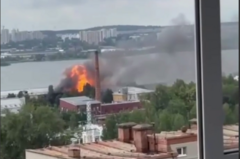As Xi Jinping prepares for an official visit to Moscow to celebrate an important historical event alongside Vladimir Putin, the implications of this meeting are far-reaching for China's international relations, particularly in Europe.
China's Strategic Dilemma: Xi's Moscow Visit and European Relations

China's Strategic Dilemma: Xi's Moscow Visit and European Relations
China's leadership faces a complex challenge as Xi Jinping strengthens ties with Russia amid strained ties with Europe.
In a time where global dynamics are shifting, China’s approach is under scrutiny. The visit of Xi Jinping to Moscow this week for discussions and celebrations with Russian President Vladimir V. Putin comes at a crucial juncture. The occasion marks the 80th anniversary of the Soviet Union's triumph over Nazi Germany in World War II, and it presents Xi with a platform to reinforce alliances while simultaneously facing criticism regarding China’s position on the ongoing Russia-Ukraine conflict.
By attending the military parade as the honored guest, Xi aims to commemorate the sacrifices made against fascism, drawing a parallel between historical fascism and current geopolitical tensions, particularly labeling U.S. actions as “bullying.” Xi’s message advocates for a united front against perceived hegemony, which he views as critical for global stability.
However, this relationship with Russia may complicate China’s strategy to cultivate allies in Europe. Observers note that Xi's presence in Moscow unequivocally associates China with Russia's military endeavors in Ukraine, a conflict that has disrupted European security and resulted in immense humanitarian costs. As Beijing seeks to mend ties with European nations to mitigate the high tariffs imposed by the United States and to safeguard trade routes, the optics of Xi’s visit could send mixed signals.
The complexity of these diplomatic relations highlights the balancing act China must perform. The country needs to uphold trade relationships with Europe, which have taken a hit following the escalation of geopolitical tensions. With trade negotiations with the U.S. forthcoming, the timing of Xi’s visit to Russia raises questions on how China will navigate its partnerships globally.
As the world watches, it remains to be seen whether Xi's efforts will strengthen support for Russia or ultimately hinder China’s ability to reestablish vital trade liaisons with European nations. All eyes are on Beijing as it maneuvers through potential economic fallout and diplomatic ramifications in a polarizing global landscape.
In a world where alliances may dictate economic viability, China's actions in the coming weeks will be critical in determining its future standing on the international stage.
By attending the military parade as the honored guest, Xi aims to commemorate the sacrifices made against fascism, drawing a parallel between historical fascism and current geopolitical tensions, particularly labeling U.S. actions as “bullying.” Xi’s message advocates for a united front against perceived hegemony, which he views as critical for global stability.
However, this relationship with Russia may complicate China’s strategy to cultivate allies in Europe. Observers note that Xi's presence in Moscow unequivocally associates China with Russia's military endeavors in Ukraine, a conflict that has disrupted European security and resulted in immense humanitarian costs. As Beijing seeks to mend ties with European nations to mitigate the high tariffs imposed by the United States and to safeguard trade routes, the optics of Xi’s visit could send mixed signals.
The complexity of these diplomatic relations highlights the balancing act China must perform. The country needs to uphold trade relationships with Europe, which have taken a hit following the escalation of geopolitical tensions. With trade negotiations with the U.S. forthcoming, the timing of Xi’s visit to Russia raises questions on how China will navigate its partnerships globally.
As the world watches, it remains to be seen whether Xi's efforts will strengthen support for Russia or ultimately hinder China’s ability to reestablish vital trade liaisons with European nations. All eyes are on Beijing as it maneuvers through potential economic fallout and diplomatic ramifications in a polarizing global landscape.
In a world where alliances may dictate economic viability, China's actions in the coming weeks will be critical in determining its future standing on the international stage.




















